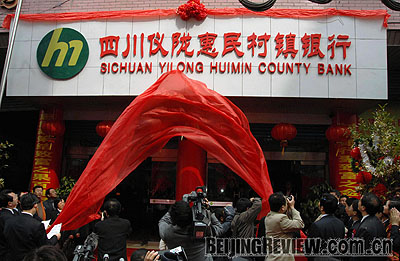|

China is moving heaven and earth to deliver long-awaited prosperity to its vast rural areas. The largest-ever reform strategy to revive the rural areas was just declared at the Third Plenary Session of the 17th Central Committee of the Communist Party of China (CPC) on October 9-12. An unmatched manufacturing boom has put the country on solid financial footing to bridge the rural-urban development gap that saps steam from the country's sustainable growth trajectory.
According to the strategy, China will push forward with all-round rural system reforms, including a series of measures ranging from increasing farmers' income and improving their social security to expanding policy support for agriculture and establishing a modern rural financial network.
"The reforms 30 years ago paved the way for China to focus its efforts on economic development," Zeng Weicheng, a villager of Shahe Town in Jiangxi Province, who witnessed the 1978 rural reforms, told the local press. "Since then the country has taken on earth-shaking changes, and we farmers have been living much better Now the new round of reforms are set to bring us greater hopes for life."
The "greater hopes" of the farmers are not unfounded. The Third Plenary Session of the 17th CPC Central Committee has pledged more policy support for modern agriculture and seeks to improve farmers' social security.
"Only on the back of modern agriculture can the countryside live up to its potentials," Li Zengjia, Director of the Agricultural Bureau of Changsha, capital of Hunan Province, was quoted as saying by the Changsha Evening News. "In my opinion, modern agriculture is built on the basis of scale production, rational management and the efficient organizations of farmers, and we will strive to accomplish those components."
"Because the new reforms tackle issues at the heart of the rural society such as outdated economic and social systems and pump input into the rural infrastructure, education and grain security, the rural areas are bound for faster and all-round development," Zhang Chengliang, Secretary of CPC Committee of Guxian County, Shanxi Province, said in an interview with the Shanxi Daily.
Wang Yinsheng, a teacher at a school for migrant workers' children in Fenghua City, Zhejiang Province, also hails the reforms.
"The migrant workers will be relieved of some family worries as a result of the reforms, which include offering equal education opportunities to the rural children," he told the local press. "I believe the further promotion of rural compulsory education will also give a boost to the countryside and help balance urban-rural development."
On the financial front, the plan to establish a rural financial network also has won applause from the public. A lack of collateral and stringent lending quotas have made it difficult for farmers to obtain financing. Insiders believe that more fiscal and tax support will become available for more qualified rural financing institutions. Besides this, more microcredit firms, rural banks and rural mutual funds are also expected to sprout up.
Jiang Zhiguo was the president of Baixin Mutual Fund in Lishu County, Jilin Province, which was the country's first rural mutual fund. He told China Business News that his fund, which is currently ineligible for the favorable tax policies, could just about make ends meet.
"The scope expansion of the favorable policies, therefore, would be cheerful news for us," Jiang said.
Feng Jiangxin, head of the Rural Bank of Hexigten Banner in Inner Mongolia Autonomous Region, echoed Jiang's opinion, citing that a multilayered financial system would be necessary to fuel the growth of the countryside.
"I suggest that state fiscal funding should follow, but not guide the funding flows of rural financial institutions so that the fiscal funding could go where most needed," Feng told China Business News. "Also, the state funding should be injected into rural banks to expand rural credit, instead of being directly poured into agriculture," added Feng. | 